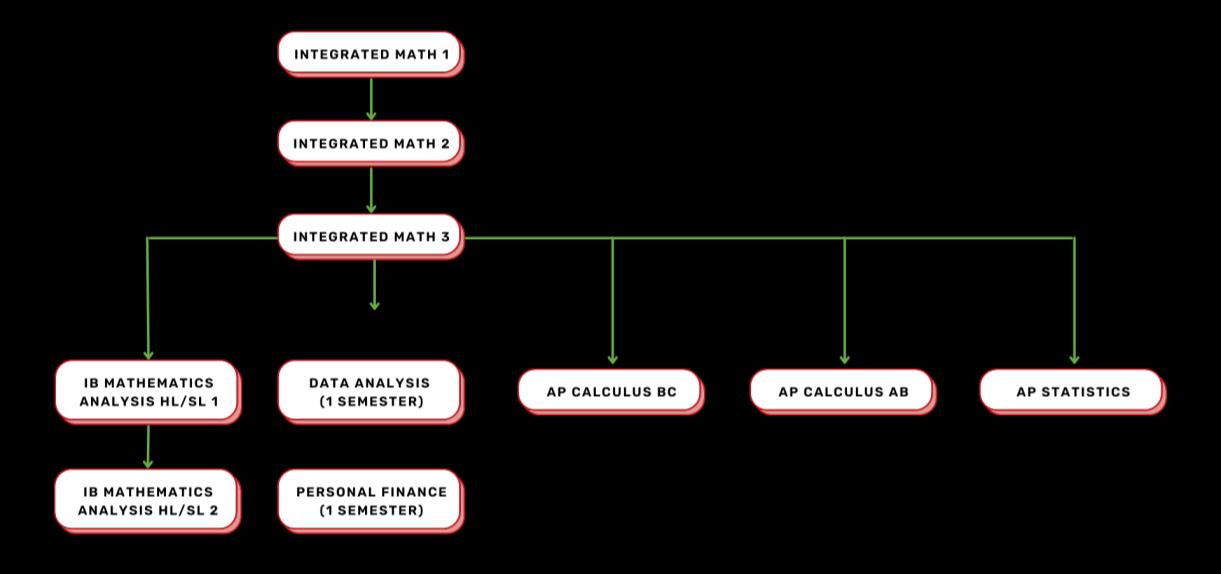
4 minute read
Performing Arts
Personal Finance
Curriculum Guide 2022 - 2023
Advertisement
Prerequisite Successful completion of Integrated Mathematics 3 Duration Semester 1: One semester only per year Units of credit 0.5
The relative importance of achievement strands in this course:
This is a one-semester course designed to understand terminology relating to personal and business mathematics applications and apply basic math and statistical skills to the solution of both personal and business applications.
It also focuses on using common mathematical formulas to solve a variety of personal and business situations as well as applying knowledge of computer and calculator use in daily life.
The emphasis on this course will be on projects and applied tasks.
Course Sequence Map

Curriculum Guide 2022 - 2023
The Performing Arts Department at AISC believes that a strong training in instrumental, vocal, and theatrical arts are conduits for teaching creative thinking and self-confidence. Our mission is deeply aligned with the core values of AISC. We see performance as a powerful tool for promoting personal growth and communication. Through the performing arts, our students learn to convey feeling and emotion, and how to make a human connection with the audience. Students of the performing arts learn to support one another, collaborate with others, and grow into well-rounded individuals, present and engaged in the world around them.
MUSIC
Symphonic Band
Prerequisite Successful completion of 1 year of Beginning Band or an audition is needed Duration 1 year Units of Credit 1
The relative importance of achievement strands in this course:

The Symphonic Band is AISC’s high school instrumental ensemble. In this performancebased course, ensemble members collaborate to achieve technical ability and creative expression on their instruments as soloists and ensemble members. The majority of class time will be spent inquiring, creating, composing, improvising, and rehearsing fun but challenging music for a public performance. Symphonic Band members also explore music theory, history, aural skills-analysis, and reflect on their music-making experiences. Reaching your highest potential is dependent on individual practice, occasional after-school rehearsals, and a commitment to each performance which leads to an inclusive experience that is creative and fun.
High School Choir
Prerequisite None Duration 1 year Units of Credit 1
The relative importance of achievement strands in this course:
Curriculum Guide 2022 - 2023

High School Choir is a mixed voice 4–8 part choir for students who are interested in learning individual and ensemble vocal skills. This course is designed to be practical in nature and is open to anyone with an interest in singing. Students do not need prior singing experience as the course is designed to provide students of any level skills and confidence in singing.
The course will cover a broad range of choral experiences, including large ensemble, small ensemble, quartets, trios, duets, and solo work. Course content will include vocal production, breathing technique, sight-singing, music theory, and performance etiquette, plus the basics of musicology, history, and composers. Music theory will be taught in the context of performance literature.
Singers will learn to be comfortable holding a part in the midst of harmonies. Assessments will include rehearsal and concert performances, theory assessments, individual vocal assessments, and individual singing tests administered regularly. Theoretical and practical examinations are held at the end of each term. Individual and ensemble performances inside and outside the classroom will be integrated into yearly course work. Individual singing tests will be administered regularly. Students will perform in regularly scheduled school concerts in addition to potential other opportunities in the community throughout the year.
THEATRE ARTS
The Theatre Arts courses explore both the conceptual and practical elements of theatre through real-world performances and design projects.
Theatre 1
Prerequisite None Duration 1 year Units of Credit 1
The relative importance of achievement strands in this course:

Theatre 1 provides students with a practical grounding in theatrical techniques and skills across a broad range of disciplines. Students who take the course will cover
Curriculum Guide 2022 - 2023
aspects of acting and performance, directing, devising original works, theatrical design, and technical theatre. Through theatre games and practical theatre projects, students will develop skills of planning, communication, and collaboration. This course is open to all grade levels who would like to take an introductory course in theatre.
Theatre 2
Prerequisites Successful completion of Theatre 1 Duration 1 year Units of Credit 1
The relative importance of achievement strands in this course:

In this course, students will build on their skills and understandings explored in Theatre 1. Students will experience unfamiliar theatrical forms, examine the ideas of theatre makers, take charge in directing, further develop their technical theatre skills and undertake practical work to create original performances.
IB Theatre HL/SL*
Prerequisite None Duration 2 years Units of Credit 1
The relative importance of achievement strands in this course:

IB Theatre gives students the opportunity to make theatre as creators, designers, directors and performers. It emphasizes the importance of working both individually and collaboratively as part of an ensemble. All students will complete three major assessments: creating and performing an original piece of devised theatre with a small group, presenting research into an unfamiliar theatrical form, and a director’s notebook of ideas for staging a published play. IB students taking theatre at the higher level will also create a solo performance based on research into a theatre practitioner. Students are encouraged to take the course as part of their IB Diploma or Certificate candidacy.
*Students joining for one year, or not seeking an IB certificate, can take the course for AISC credit with modified assessment criteria.










